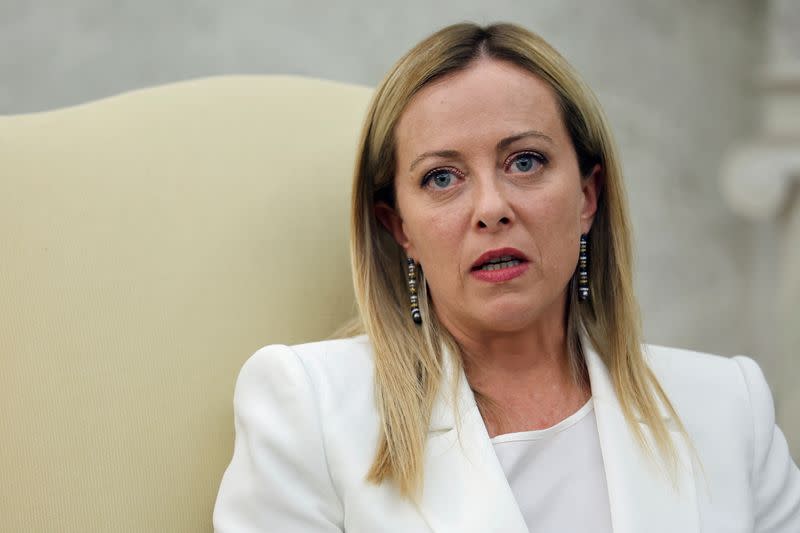Italy GDP unexpectedly shrinks in blow to Meloni
By Giuseppe Fonte and Antonella Cinelli
ROME (Reuters) -Italy's economy performed surprisingly poorly in the second quarter, data showed on Monday, offering an uncomfortable outlook for Prime Minister Giorgia Meloni as her government tries to tackle the negative impact of high inflation.
Gross domestic product (GDP) contracted by 0.3% on a quarterly basis between April and June and was up 0.6% year-on-year, national statistics bureau ISTAT said. A Reuters analyst survey had pointed to a flat reading quarter-on-quarter and a 0.9% yearly rise.
The gloomy data makes it harder for the government to reach its stated goal of 1% growth rate this year, although the Treasury said the target "is still fully within reach."
Rome added it would continue to work to implement its EU-funded national post-COVID investment programme and to bring inflation down.
In a report for Capital Economics, Franziska Palmas wrote Italy was no longer outperforming its peers, estimating the country would experience a "sharper drop in output than other euro zone majors in the second half of 2023."
The figures cast a shadow on the country's banking sector, where the top two lenders - Intesa Sanpaolo and UniCredit - last week posted much stronger than expected earnings helped also by low, or non existent in the latter's case, provisions against loan losses.
ISTAT gave no numerical sector breakdown of its preliminary second-quarter GDP estimate, but said industry and agriculture output decreased whereas services grew marginally.
The 0.3% contraction left Italy with so-called "carryover" growth of 0.8% this year, assuming GDP would be flat in the remaining two quarters.
In recent weeks, the government has said the economy could grow by at least 1.2% this year, arguing that a positive trend in the service sector supported by booming tourism would be enough to offset a widely expected slowdown in manufacturing activities.
"Italy is an advanced industrial country and the weakness in industry is much more important than the tourism sector for the economy's health," said Lorenzo Codogno, head of LC Macro Advisors and former chief economist at Italy's Treasury.
ISTAT also said annual inflation slowed to 6.4% in July from 6.7% in June, on a EU-harmonised consumer prices.
Annual growth in prices of food, household and personal care stood at 10.4%, broadly in line with that of the month before and over 50% higher than the overall index.
To help the poorest, the government hopes to announce this week a deal with supermarkets and producers to control prices of essential consumer goods in the final three months of the year.
(Additional reporting by Alvise Armellini in Rome and Elvira Pollina and Valentina Za in Milan; Editing by Sharon Singleton and Alistair Bell)

 Yahoo Finance
Yahoo Finance 

